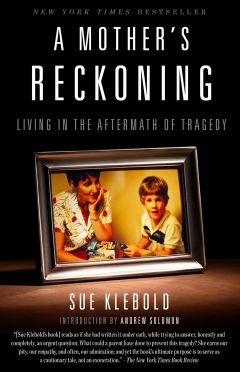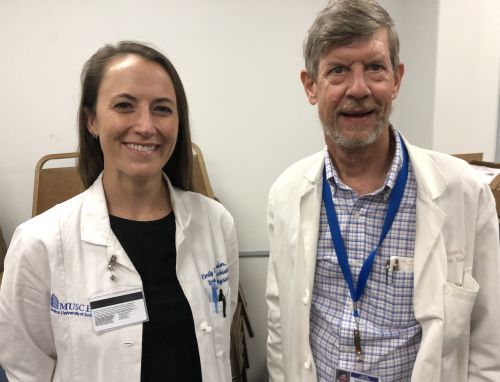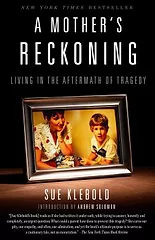 A Mother's Reckoning: Living in the Aftermath of Tragedy
A Mother's Reckoning: Living in the Aftermath of Tragedy
By Sue Klebold; Introduction by Andrew Solomon, PhD
New York, NY: Crown Publishers; 2016
Dr. Higgins:
Sue and Tom were living an ordinary American middle-class life in a nice neighborhood on the outskirts of Denver. They had been married 30 years and raised two boys. Their youngest son had been a playful, loving child. They called him their “sunshine boy.” In high school he had nice friends, earned good grades, and was heading to University of Arizona in the fall. He had recently attended his school prom and even danced with his date. Sue described him as an “even tempered adolescent.” She recalls thinking, “I’ve done a good job.”
Then she got a call: “There’s been a shooting at Columbine High School.”
In A Mother’s Reckoning: Living in the Aftermath of Tragedy, Sue Klebold takes us through the horror of discovering a cherished son is now one of the most hated men in America—and she’s the mother of a criminal.
Shock, panic, disbelief, conflicting information, close-lipped policeman searching her home—these slowly give way to the truth.
As the details emerge, she’s forced to relinquish core beliefs about her son and her own identity. At first, she tells herself it’s all a misunderstanding. Then she shifts to believing HE wasn’t shooting students. Later, faced with the undeniable details, she rigidly harbors the belief her son was brainwashed by the other shooter, and had no ill intent.
When she learns survivors reported witnessing her son shoot a student hiding under a table, her defenses broke. But it was seeing her son’s “crazy rage” and “hate filled” words in the Basement Tapes that ripped away her last hopes that he was not a full participant.
Sue’s story of her recovery is the search to understand the son she didn’t know.
Dr. Whisler:
A mother’s knowledge of her infant is perhaps the most complete of any interpersonal relationship. The total control over an infant’s life and the belief that parent knows best gives way incrementally as the developing child gains independence. For this reason, parents might struggle to recognize their diminishing understanding of their child. In A Mother’s Reckoning, the author goes to great lengths to dissect her perception of her son and shares her devastation in recognizing his outward presentation did not match his internal state of depressive rage.
In the aftermath of Columbine, the Klebolds were faced with criticism from horrified parents: How could they not have known? This emotional assertion was contrasted by the innumerable letters and stories received from strangers and friends describing their own anguish and disturbing experiences hidden from parents during their teen years. Many parents think they are different. But the truth is we cannot ever know the complete inner workings of our children.
Parents believe they can mold their children, that kids are Play-Doh properly shaped by loving, well-intentioned parents. So, they give life instructions on the “best” directions forward, not always appreciating their child’s temperament or the power of peer groups and genetics. Throughout the book, Sue reimagines interactions with Dylan which she wishes had ended differently. The consistent theme is one of action-oriented control, nitpicking moments and seasons of their lives. In reading this story there is a strong draw to do the same and fall into the trap of evaluating each moment as a potentially pivotal one.
What is clear is that Dylan did not feel safe discussing his troubled thoughts. Could some of his parents’ actions have driven his suicidal thoughts and hostility underground? Perhaps. But this is true for many kids who do not feel comfortable sharing intimate details with their parents. In searching for the answer, Sue fantasizes what she wishes she had done: sit in silence rather than lecture; acknowledge Dylan’s feelings; be more curious.
Further reading/resources:
National Suicide Prevention Lifeline 1–800–273-TALK (8255)
Are School Shooters Psychopaths?
Ronald W. Pies, MD, explores the assessment of psychopathy and how a better understanding of these individuals may help us prevent future school shootings. Psychiatric Times, 2022.
Mass Shootings and Mental Illness [PDF]
In the book chapter by James L. Knoll IV, MD, and George D. Annas, MD, MPH, it is stated that less than 1% of all gun-related homicides in a year are caused by individuals with serious mental illness. This statement is supported by evidence-based facts and the chapter also reviews common misconceptions related to this topic. See: Gun Violence and Mental Illness, edited by Liza H. Gold, MD, and Robert I. Simon, MD (American Psychiatric Association Publishing; 2016.
 Dr. Whisler is a Child & Adolescent Psychiatry Fellow, Stanford University School of Medicine. Dr. Higgins is Affiliate Associate Professor, Psychiatry and Behavioral Sciences, Medical University of South Carolina.
Dr. Whisler is a Child & Adolescent Psychiatry Fellow, Stanford University School of Medicine. Dr. Higgins is Affiliate Associate Professor, Psychiatry and Behavioral Sciences, Medical University of South Carolina.

_-The-Breakthrough-Antipsychotic-That-Could-Change-Everything.webp?t=1729528747)



